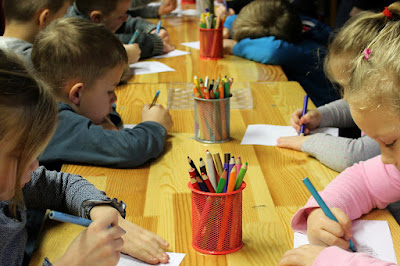The way I organized summer reading and programming was very different from what my predecessor had done, but more in line with what most libraries seem to do.
She only had it for four weeks, relied very heavily on paid performers, did not have storytimes in the summer, and did not have age-specific programs. The best I can tell is that her programs were kind of a drop-in free-for-all with various crafts or activities set out, and she did this once or twice a week, in addition to paid performers once or twice a week.I felt like people needed something for the whole summer, and a little less intense. I also felt that is important to continue storytime in the summer, as well as have more age-specific programming. I'd been told by several people that the person before me didn't really program for the older kids, just the younger ones, and the teen person programs for middle school and high school ages, so elementary kids just got left out. So I wanted to be sure to have programs just for them in the summer.
I planned on a weekly rotation, with everything in the morning in case we had to be outside due to Covid. I felt having things on the same day and time each week would make it easier for caregivers to remember. I kept Monday's free for planning and prep, then had toddler storytime on Tuesday, preschool storytime on Wednesday, Thursdays were paid performers or movie days (to give me extra prep time for the elementary programs), and Fridays were for elementary programs. My co-worker had teen programs in the afternoons or on Saturdays, but not necessarily every week.I also required registration, because I had limited supplies for some programs, and we didn't want people to be too crowded together due to Covid.
We did follow the CLSP theme of "Oceans of Possibilities" and most of our programs tied in with that theme. I also ended up having loose weekly sub-themes. It was a super easy theme to decorate and program around. We also started with a kick-off party, with a variety of games, crafts, and costumed characters, as well as a caricature artist.
In general, everything went well. The kick-off was hugely successful, we got a lot of positive feedback about our programs, and programs were well attended. The elementary age-group programs were particularly popular and well-attended, though we did have trouble with a few people who couldn't understand the concept of age-specific programming and came in just assuming it was for all ages, even though it was clearly labeled and marketed as being for ages 6-10 and there were other programs for toddlers, preschoolers, and families.
While I will probably do things very similar next year, there are some things I've learned that will impact next summer's programming:
- No one cares about watching free movies at the library anymore, even with free snacks.
- This community needs more all-ages family programming.
- People had a very hard time with the concept of registering for each program (and that it was different from registering for the reading challenge). They thought if they registered once, they were registered for everything all summer.
- Attendance dropped significantly for the preschool and toddler programs in July, and slightly for the elementary programs.
- I cannot do all the kids' programming myself, and will have to delegate at least some to our full-time teen specialists (who does fewer programs in the summer) and our part-time associate (she had just started in May, so I didn't want to throw her into programming that soon).
- I definitely need to have programs planned out better further in advance. I was scrambling to stay caught up summer as I was still planning as I went.
- Plan the first week's programs to be easy, low-fuss, and using materials that are easy to stretch in case of unexpectedly high numbers. Allow for time at the beginning to explain how it all works, expectations, rules, etc.
- Do NOT plan on making slime or doing anything more involved or with safety concerns the first week or two, that's better for once you've gotten to know your group and things are going smoothly.
- Be prepared for pushback if you enforce ages, and make sure your manager/director will back you up. I had a mom throw a hissy fit and make a big scene, then trash me on Facebook because I would not let her toddler participate in a program for elementary ages due to safety concerns with the particular activity. She had been told this in advance, and hoped to bully me into giving in by making a scene. She found out I don't give in to bullies or tantrums, whether by a 4 year old or a 40 year old, and my director and several other parents backed me up. I knew if I gave in, there would be no end to it.

No comments:
Post a Comment